AWM41 1072 - [Official History, 1914-18 War: Records of Arthur G Butler:] Interviews containing accounts of Nursing experiences in the AANS [Australian Army Nursing Service]. These nurses were interviewed by Matron Kellett - Part 4
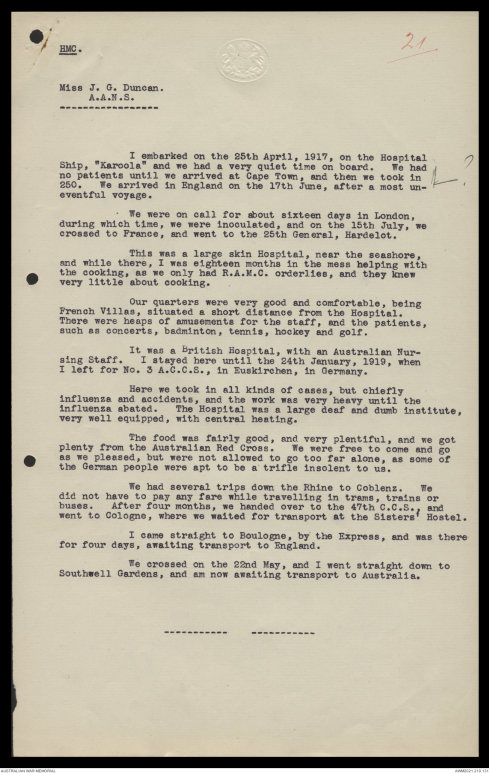
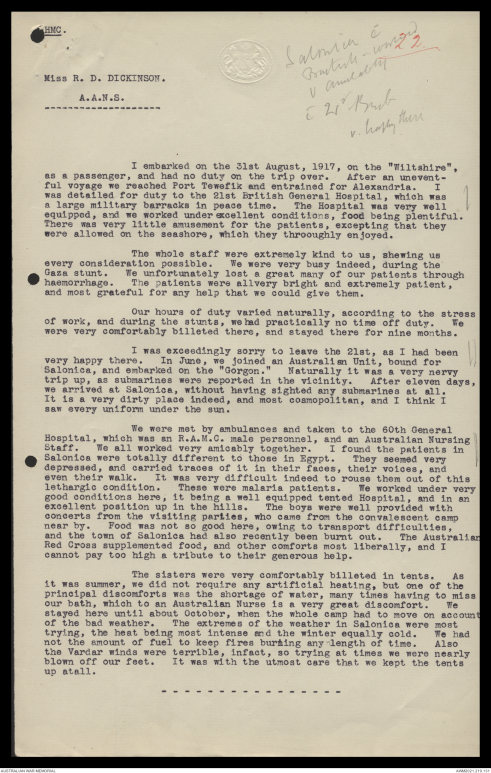
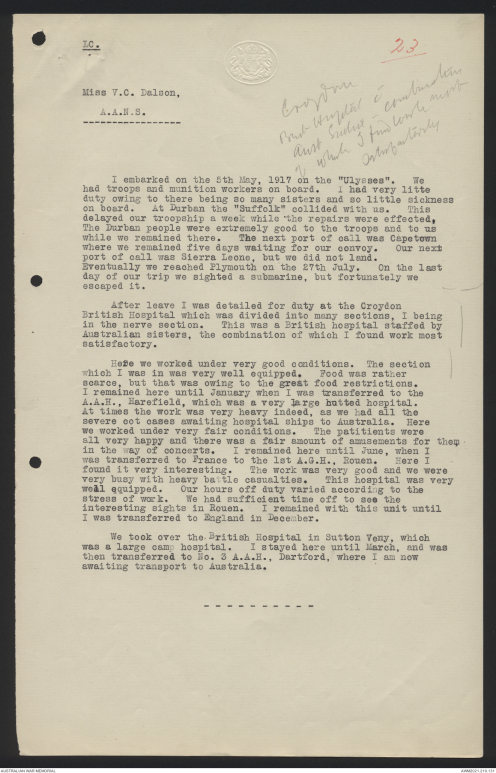
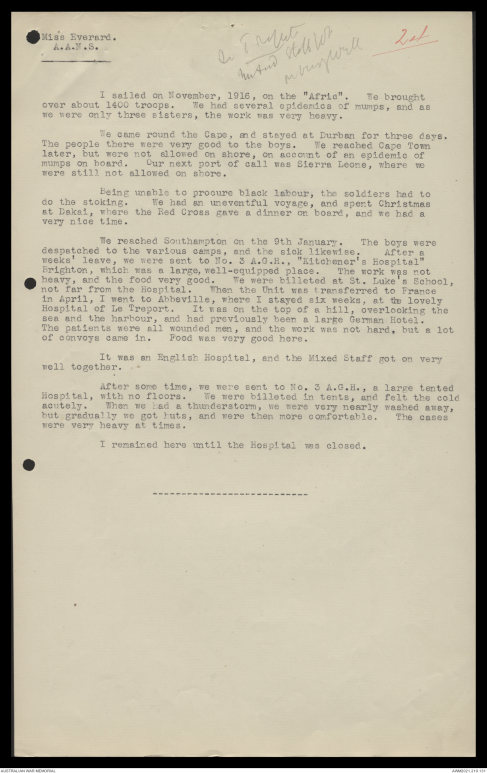
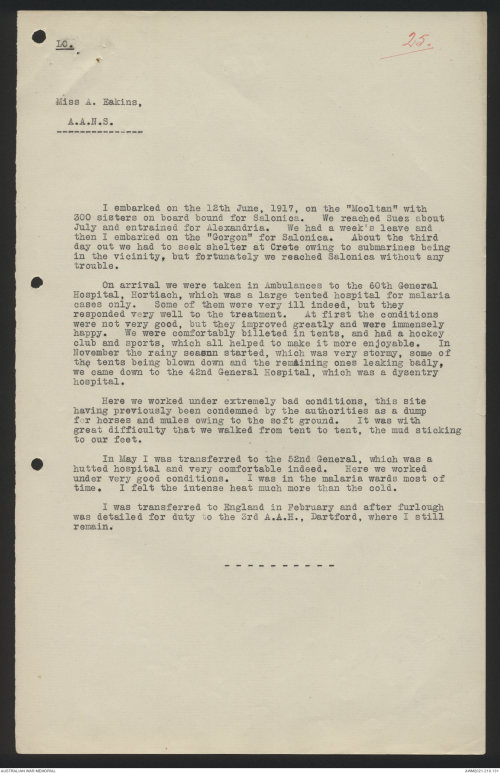
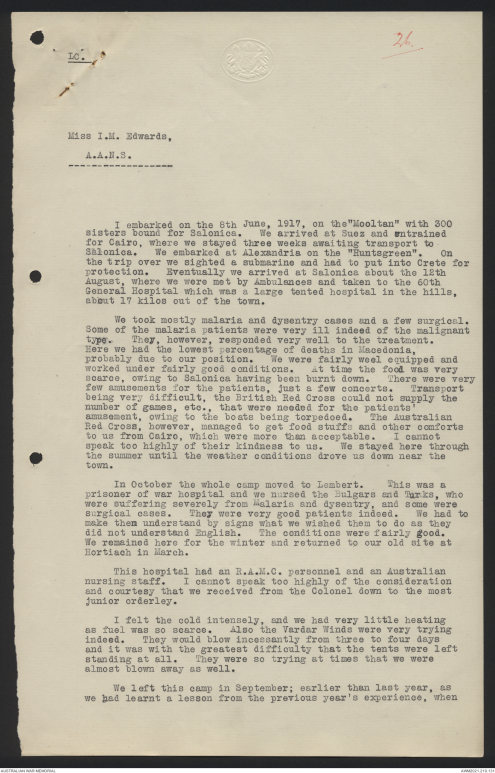
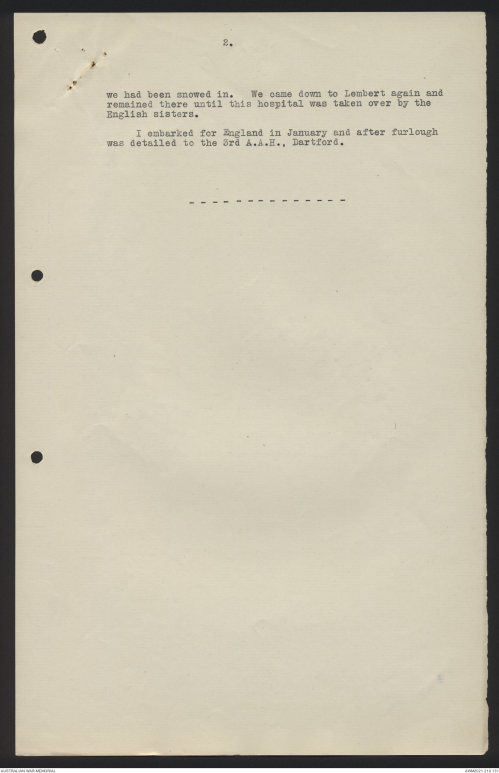
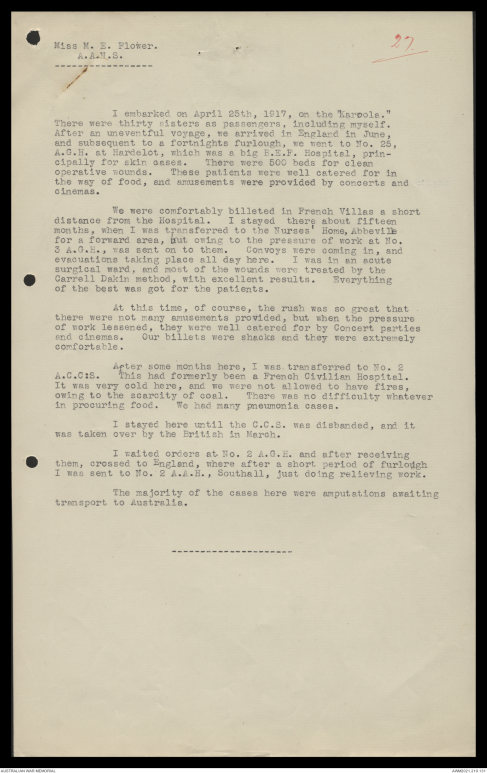
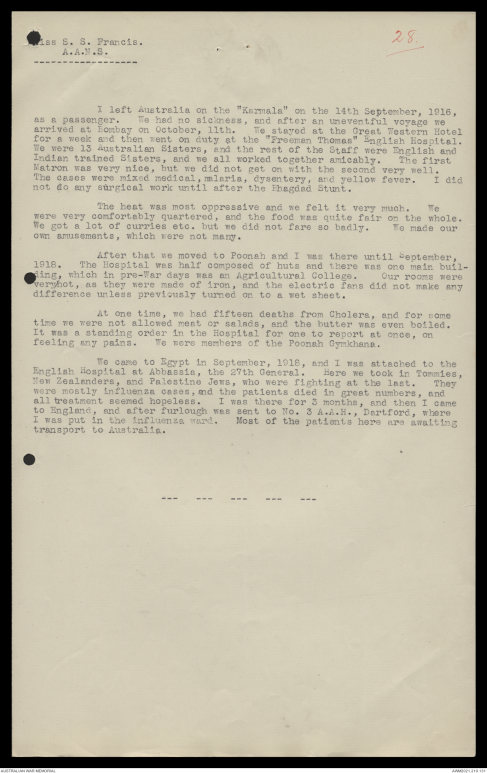
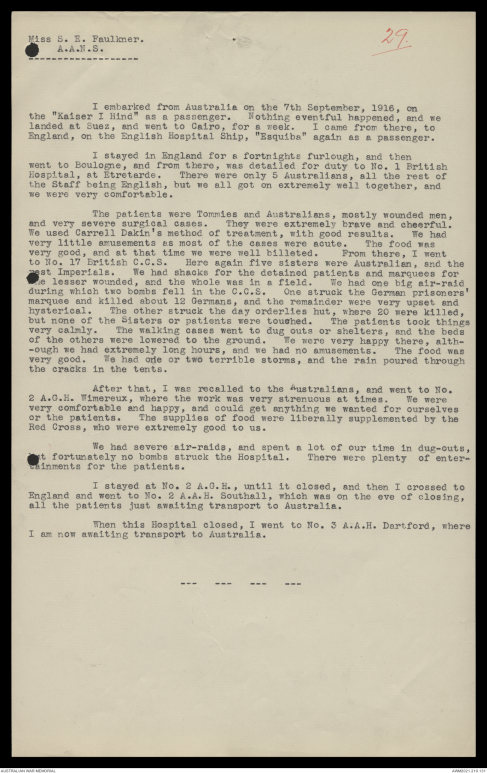
21
HMC.
Miss J. G. Duncan.
A.A.N.S.
-----------------
I embarked on the 25th April, 1917, on the Hospital
Ship, "Karoola" and we had a very quiet time on board. We had
[*?*]
no patients until we arrived at Cape Town, and then we took in
250. We arrived in England on the 17th June, after a most uneventful
voyage.
We were on call for about sixteen days in London,
during which time, we were inoculated, and on the 15th July, we
crossed to France, and went to the 25th General, Hardelot.
This was a large skin Hospital, near the seashore,
and while there, I was eighteen months in the mess helping with
the cooking, as we only had R.A.M.C. orderlies, and they knew
very little about cooking.
Our quarters were very good and comfortable, being
French Villas, situated a short distance from the Hospital.
There were heaps of amusements for the staff, and the patients,
such as concerts, badminton, tennis, hockey and golf.
It was a British Hospital, with an Australian Nursing
Staff. I stayed here until the 24th January, 1919, when
I left for No. 3 A.C.C.S., in Euskirehen, in Germany.
Here we took in all kinds of cases, but chiefly
influenza and accidents, and the work was very heavy until the
influenza abated. The Hospital was a large deaf and dumb institute,
and very well equipped, with central heating.
The food was fairly good, and very plentiful, and we got
plenty from the Australian Red Cross. We were free to come and go
as we pleased, but were not allowed to go too far alone, as some of
the German people were apt to be a trifle insolent to us.
We had several trips down the Rhine to Coblenz. We
did not have to pay any fare while travelling in trams, trains or
buses. After four months, we handed over to the 47th C.C.S., and
went to Cologne, where we waited for transport at the Sister' Hostel.
I came straight to Boulogne, by the Express, and was there
for four days, awaiting transport to England.
We crossed on the 22nd May, and I went straight down to
Southwell Gardens, and am now awaiting transport to Australia.
----------- -----------
22
HNC.
[*Salonica E*]
[*?*]
Miss R. D. Dickinson.
[*v ?*]
A.A.N.S.
--------------------
[*E 21st B?*]
[*v happy there*]
I embarked on the 31st August , 1971, on the "Wiltshire",
as a passenger, and had no duty on the trip over. After an uneventful
voyage we reached Port Tewefik and entrained for Alexandria. I
was detailed for duty to the 21st British General Hospital, which was
a large military barracks in peace time. The Hospital was very well
equipped, and we worked under excellent conditions, food being plentiful.
There was a very little amusement for the patients, excepting that they
were allowed on the seashore, which they throoughly enjoyed.
The whole staff were extremely kind to us, shewing us
every consideration possible. We were very busy indeed, during the
Gaza stunt. We unfortunately lost a great many of our patients through
haemorrhage. The patients were allvery bright and extremely patient,
and most grateful for any help that we could give them.
Our hours of duty varied naturally, according to the stress
of work, and during the stunts, we had practically no time off duty. We
were very comfortably billeted there, and stayed there for nine months.
I was exceedingly sorry to leave the 21st, as I had been
very happy there. In June, we joined an Australian Unit, bound for
Salonica, and embarked on the "Gorgon." Naturally it was a very nervy
trip up, as submarines were reported in the vicinity. After eleven days,
we arrived at Salonica, without having sighted any submarines at all.
It is a very dirty place indeed, and most cosmopolitan, and I think I
saw every uniform under the sun.
We were met by ambulances and taken to the 60th General
Hospital, which was an R.A.M.C. male personnel, and an Australian Nursing
Staff. We worked very amicably together. I found the patients in
Salonica were totally different to those in Egypt. They seemed very
depressed, and carried traces of it in their faces, their voices, and
even their walk. It was a very difficult indeed to rouse them out of this
lethargic condition. These were malaria patients. We worked under very
good conditions here , it being a well equipped tented Hospital, and in an
excellent position up in the hills. The boys were well provided with
concerts from the visiting parties, who came from the convalescent camp
near by. Food was not so good here, owing to transport difficulties,
and the town of Salonica had also recently burnt out. The Australian
Red Cross supplement food, and comforts most liberally and I
cannot pay too high a tribute to their generous help.
The sisters very very comfortably billeted in tents. As
it was summer, we did not require any artificial heating, but one of the
principal discomforts was the shortage of water, many times having to miss
our bath, which to an Australian Nurse is a very great discomfort. We
stayed here until about October, when the whole camp had to move on account
of the bad weather. The extremes of the weather in Salonica were most
trying, the heat being most intense and the winter equally cold. We had
not the amount of fuel to keep fires burning any length of time. Also
the Vardar winds were terrible, infact, so trying at times we were nearly
blown off our feet. It was with the utmost care that we kept the tents
up atall.
----------
LC.
23
Miss V.C. Dalson.
A.A.N.S.
[Handwriting?]
[*Cr(?)*]
[*Pr(?)*]
[*Aunt Sudut(?) - C(?)*]
-----------------
I embarked on the 5th May, 1917 on the "Ulysses". We
had troops and munition workers on board. I had very little
duty owing to there being so many sisters so little sickness
on board. At Durban the "Suffolk" collided with us. This
delayed our troopship a week while the repairs were effected.
The Durban people were extremely good to the troops and to us
while we remained there. The next port of call was Capetown
where we remained five days waiting for our convoy. Our next
port of call was Sierra Leone, but we did not land.
Eventually we reached Plymouth on the 17th July. On the 1sst
day of our trip we sighted a submarine, but fortunately we
escaped it.
After leave I was detailed for duty at the Croydon
British Hospital which was divided was divided into many sections, I being
in the nerve section. This was a British hospital staffed by
Australian sisters, the combination of which I found work most
satisfactory.
Here we worked under very good conditions. The section
which I was in was very well equipped. Food was rather
scarce, but that was owing to the great food restrictions.
I remained here until January when I was transferred to the
A.A.H., Harefield, which was a very large hutted hospital.
At times the work was very heavy indeed, as we had all the
severe cot cases awaiting hospitals ships to Australia. Here
we worked under very fair conditions. The patitients were
all very happy and there was a fair amount of amusements for them
in the way of concerts. I remained here until June, when I
was transferred to France to the 1st A.G.H, Rouen. Here I
found it very interesting. The was very good and we were
very busy with heavy battle casualties. This hospital was very
well equipped. Our hours off duty varied according to the
stress of work. We had sufficient tie off to see the
interesting sights in Rouen. I remained with this unit until
I was transferred to England in December.
We took over the British Hospital in Sutton Veny, which
was a large camp hospital. I stayed here until March and was
then transferred to No. 3 A.A.H., Dartford where I am now
awaiting transport to Australia.
-------
Miss Everard.
A.A.N.S.
24
[Handwriting?]
[*Dr T(?)*]
____________
I sailed on November, 1916 on the "Afric". We brought
over about 1400 troops. We had several epidemics of mumps, and as
we were only three sisters, the work was very heavy.
We came round the Cape, and stayed at Durban for three days.
The people there were very good to the boys. We reached Cape Town
later, but were not allowed on short, on account of an epidemic of
mumps on board. Our next port of call was Sierra Leone, where we
were still not allowed on shore.
Being unable to procure black labour, the soldiers had to
do the stoking. We had an uneventful voyage, and spent Christmas
at Dakai, where the Red Cross gave a dinner on board, and we had
very nice time.
We reached Southampton on the 9th January. The boys were
despatched to various camps, and the sick likewise. After a
weeks' leave, we were sent to No. 3 A.G.H., "Kitchener's Hospital"
Brighton, which was a large well-equipped place. The work was not
heavy, and the food very good. We were billeted at St. Luke's School,
not far from the Hospital. When the Unit was transferred to France
in April, I went to Abbeville, where I stayed six weeks, at the lovely
Hospital of Le Treport. It was on the top of a hill, overlooking the
sea and the harbour, and had previously been a large German Hotel.
The patients were all wounded men, and the work was not hard, but a lot
of convoys came in. Food was very good here.
It was an English Hospital, and the Mixed Staff got on very
well together.
After some time, we were sent to No. 3 A.G.H., a large tented
Hospital, with no floors. We were billeted in tents, and felt the cold
acutely. When we had a thunderstorm, we were very nearly washed away,
but gradually we got huts, and were then more comfortable. The cases
were very heavy at times.
I remained here until the Hospital was closed.
--------------------------
LC.
25
Miss A. Eakins.
A.A.N.S.
-----------------
I embarked on the 12th June, 1917 on the "Mooltan" with
300 sisters on board bound for Salonica. We reached Suez about
July and entrained for Alexandria. We had a week's leave and
then I embarked on the "Gorgon" for Salonica. About the third
day out we had to seek shelter at Crete owing to submarines being
in the vicinity, but fortunately we reached Salonica without any
trouble.
On arrival we were taken in Ambulances to the 60th General
Hospital, Hortiach, which was a large tented hospital for malaria
cases only. Some of them were very ill indeed, but they
responded very well to the treatment. At first the conditions
were not very good, but they improved greatly and were immensely
happy. We were comfortably billeted in tents, and had a hockey
club and sports which all helped to make it more enjoyable. In
November the rainy seasnn started, which was very stormy, some of
the tents being blown down and the remaining ones leaking badly,
we came down to the 42nd General Hospital, which was a dysentry
hospital.
Here we worked under extremely bad conditions, this site
having previously been condemned by the authorities as a dump
for horses and mules owing to the soft ground. It was with
great difficulty that we walked from tent to tent, the mud sticking
to our feet.
In May I was transferred to the 52nd General, which was a
hutted hospital and very comfortable indeed. Here we worked
under very good conditions. I was in the malaria wards most of
time. I felt the intense heat much more than the cold.
I was transferred to England in February and after furlough
was detailed for duty to the 3rd A.A.H., Dartford, where I still
remain.
--------
LC.
26
Miss I.M. Edwards.
A.A.N.S.
-----------------
I embarked on 8th June, 1917, on the “Mooltan” with 300
sisters bound for Salonica. We arrived at Suez and and entrained
for Cairo, where we stayed three weeks of awaiting transport to
Salonica. We embarked at Alexandria on the “Huntsgreen”. On
the trip over we sighted a submarine and had to put into Crete for
protection. Eventually we arrived at Salonica about the 12th .
August, where we were met by Ambulances and taken to the 60th.
General Hospital which was a large tented hospital in the hills,
about 17 kilos out of the town.
We took mostly malaria and dysentry cases and a few surgical.
Some of the malaria patients were very ill indeed of the malignant
type. They, however, responded very well to the treatment.
Here we had the lowest percentage of deaths in Macedonia,
probably due to our position. We were fairly weel equipped and
worked under fairly good conditions. At time the food was very
scarce, owing to Salonica having been burnt down. There were very
few amusements for the patients, just a few concerts. Transport
being very difficult, the British Red Cross could not supply the
number of games, etc., that were needed for the patients’
amusement, owing to the boats being torpedoed. The Australian
Red Cross, however, managed to get food stuffs and other comforts
to us from Cairo, which were more than acceptable. I cannot
speak too highly of their kindness to us. We stayed here through
the summer until the weather conditions drove us down near the
town.
In October the whole camp move to Lembert. This was a
prisoner of war hospital and we nursed the Bulgars and Turks, who
were suffering severely from Malaria and dysentry, and some were
surgical cases. They were very good patients indeed. We had to
make them understand by signs what we wished them to do as they
did not understand English. The conditions were fairly good.
We remained here for the winter and return to our old site at
Hortiach in March.
This hospital had an R.A.M.C. personnel and an Australian
nursing staff. I cannot speak too highly of the consideration
and courtesy that we received from the Colonel down to the most
junior orderly.
I felt this cold intensely, and we had very little heating
as fuel was so scarce. Also, the Vadar Winds were very trying
indeed. They would blow incessantly from three to four days
and it was with the greatest difficulty that the tents were left
standing at all. They were so trying at times that we were
almost blown away as well.
We left this camp in September: earlier than last year, as
we had learnt a lesson from the previous year’s experiences when
2.
we had been snowed in. We came down to Lembert again and
remained there until this hospital was taken over by the
English sisters.
I embarked for England in January and after furlough
was detailed to the 3rd A.A.H., Dartford.
- - - - - - - - - - - - - -
27
Miss M. E. Flower.
A.A.N.S.
-----------------
I embarked on April 25th, 1917, on the “Karoola.”
There were thirty sisters as passengers, including myself.
After an uneventful voyage, we arrived in England in June,
and subsequent to a fortnights furlough, we went to No. 25,
A.G.H. at Hardelot, which was a big B.E.F. hospital, principally
for skin cases. There were 500 beds for clean
operative wounds. These patients were well catered for in
the way of food, and amusements were provided by concerts and
cinemas.
We were comfortably billeted in French Willas a short
distance from the hospital. I stayed there about fifteen
months, when I was transferred to the Nurses’ Home Abbeville
for a forward area, but owing to the pressure of work at No.
3 A.G.H., was sent on to them. Convoys were coming in, and
evacuations taking place all day here. I was in an acute
surgical ward, and most of the wounds were treated by the
Carrell Dakin method, with excellent results. Everything
of the the best was got for the patients.
At this time, of course, the rush was so great that
there were not many amusements provided, but when the pressure
of work lessened, they were well catered for by Concert parties
and cinemas. Our billets were shacks and they were extremely
comfortable.
After some months here, I was transferred to No. 2
A.C.C:S. This had formerly been a French Civilian Hospital.
It was very cold here, and we were not allowed to have fires,
owing to the scarcity of coal. There was no difficulty whatever
in procuring food. We had many pneumonia cases.
I stayed here until the C.C.S. was disbanded, and it
was taken over by the British in March.
I waited orders at No. 2 A.G.H. and after receiving
them, crossed to England, where after a short period of furlough
I was sent to No. 2 A.A.H., Southall, just doing relieving work.
The majority of the cases here were amputations awaiting
transport to Australia.
---------------------
28
Miss S. S. Francis.
A.A.N.S.
-----------------
I left Australia on the “Karmala” on 14th September, 1916,
as a passenger. We had no sickness, and after an uneventful voyage we
arrived at Bombay on October, 11th. We stayed at the Great Western Hotel
for a week and then went on duty at the “Freeman Thomas” English Hospital.
We were 13 Australian Sisters, and the rest of the Staff were English and
Indian trained Sisters, and we all worked together amicably. The first
Matron was very nice, but we did not get on with the second very well.
The cases were mixed medical, malaria, dysentery, and yellow fever. I did
not do any surgical work until after the Bhagdad Stunt.
The heat was most oppressive and we felt it very much. We
were very comfortably quartered, and the food was quite fair on the whole.
We got a lot of curries etc. but we did not fare so badly. We made our
own amusements, which were not many.
After that we moved to Poona and I was there until September,
1918. The Hospital was half composed of huts and there was one main building,
which in pre-War days was an Agricultural College. Our rooms were
veryhot, as they were made of iron, and the electric fans did not make any
difference unless previously turned on to a wet sheet.
At one time, we had 15 deaths from Cholera, and for some
time we were not allowed meat or salads, and the butter was even boiled.
It was a standing order in the Hospital for one to report at once, on
feeling any pains. We were members of the Poona Gymkhana.
We came to Egypt in September, 1918, and I was attached to the
English Hospital at Abbassia, the 27th Heneral. Here we took in Tommies,
New Zealanders, and Palestine Jews, who are fighting at the last. They
were mostly influenza cases, and the patients died in great numbers, and
all treatment seemed hopeless. I was there for 3 months, and then I came
to England, and after furlough was sent to No. 3 A.A.H., Dartford, where
I was put in the influenza ward. Most of the patients here are awaiting
transport to Australia.
--- --- --- --- ---
29
Miss S. E. Faulkner.
A.A.N.S.
-----------------
I embarked from Australia on the 7th September, 1916, on
the “Kaiser I Hind” as a passenger. Nothing eventful happened, and we
landed at Suez, and went to Cairo, for a week. I came from there, to
England, on the English Hospital Ship, “Esquiba” again as a passenger.
I stayed in England for a fortnights furlough, and then
went to Boulogne, and from there, was detailed for duty to No. 1 British
Hospital at Etretarde. There were only 5 Australians, all the rest of
the Staff being English, but we all got on extremely well together, and
we were very comfortable.
The patients were Tommies and Australians, mostly wounded men,
and very severe surgical cases. They were extremely brave and cheerful.
We used Carrell Dakin’s method of treatment, with good results. We had
very little amusements as most of the cases were acute. The food was
very good, and at that time we were well billeted. From there, I went
to No. 17 British C.C.S. Here again five sisters were Australian, and the
rest Imperials. We had shacks for the detained patients and marquees for
the lesser wounded, and the whole was in the field. We had one big air-raid
during which two bombs fell into the C.C.S. One struck the German prisoners’
marquee and killed about 12 Germans, and the remainder were very upset and
hysterical. The other struck the day orderlies hut, where 20 were killed,
but none of the Sisters or patients were touched. The patients took things
very calmly. The walking cases went to dug outs or shelters, and the beds
of the others were lowered to the ground. We were very happy there, although
we had extremely long hours, and we had no amusements. The food was
very good. We had one or two terrible storms, and the rain poured through
the cracks in the tents.
After that, I was recalled to the Australians, and went to No.
2 A.G.H. Wimereux, where the work was very strenuous at times. We were
very comfortable and happy, and could get anything we wanted for ourselves
or the patients. The supplies of food were literally supplemented by the
Red Cross, who were extremely good to us.
We had severe air-raids, and spent a lot of our time in dug-outs,
but fortunately no bombs struck the Hospital. There were plenty of entertainments
for the patients.
I stayed at No. 2 A.G.H., until it closed, and then I cross to
England and went to No. 2 A.A.H. Southall, which was on the eve of closing,
all the patients just waiting transport to Australia.
When this Hospital closed, I went to No. 3 A.A.H. Dartford, where
I am now awaiting transport to Australia.
--- --- --- ---
 Sam scott
Sam scottThis transcription item is now locked to you for editing. To release the lock either Save your changes or Cancel.
This lock will be automatically released after 60 minutes of inactivity.